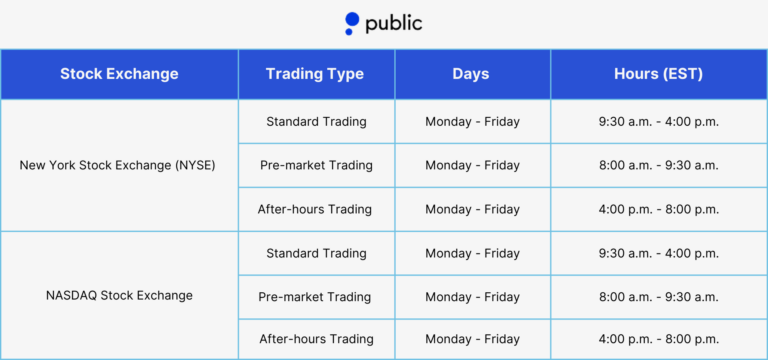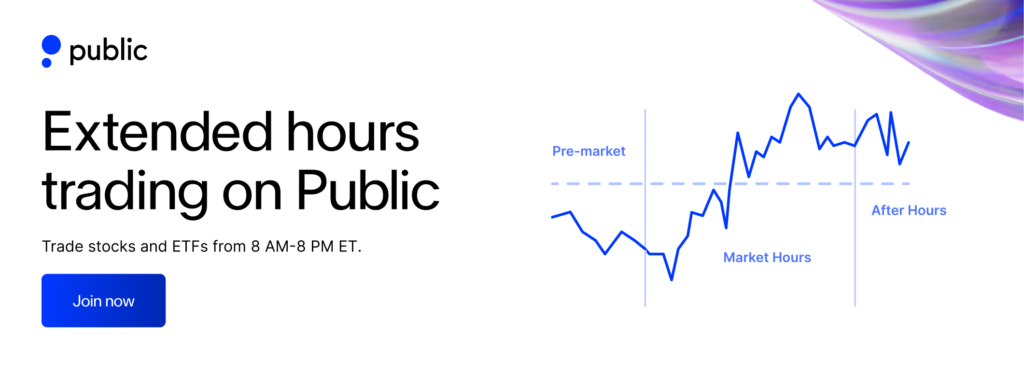As a U.S. investor, understanding stock market hours is crucial for effective trading and making informed decisions. Knowing when the market operates and the different trading windows available can significantly impact your investment strategy, whether you’re actively managing your portfolio or keeping an eye on market trends.
This knowledge may allow you to capitalize on opportunities, avoid unexpected downtime, and navigate market fluctuations efficiently. In this blog, we’ll break down everything you need to know about stock market hours, including regular trading times, after-hours trading, and more.
Stock market hours
In the U.S., the primary stock exchanges are the New York Stock Exchange (NYSE) and the Nasdaq. These two exchanges are open for trading during specific hours on weekdays, excluding holidays.
However, there are opportunities for pre-market and after-hours trading beyond the standard trading hours, which may cater to more advanced or flexible investors. The regular trading hours for the U.S. stock exchanges like NYSE and Nasdaq are:
So, if you’re trading stocks listed on either of these exchanges, your orders will be executed during this time frame.
Stock market holidays
The stock market operates from Monday to Friday, but it’s important to remember that it’s closed on weekends. Additionally, the market observes certain holidays when trading is either completely halted or subject to early closures. Some of these holidays include:
Key holidays with early market closures
There are also shortened trading days on the U.S. stock exchange that include:
1. The day before Independence Day (July 3rd):
- Date: The market closes early on the day before Independence Day, which is observed on July 4th.
- Early close time: 1:00 PM ET.
- Note: If July 4th falls on a weekend, the market observes the holiday on the nearest weekday, and the early closure occurs on the preceding trading day.
2. Day after Thanksgiving (Black Friday):
- Date: The market closes early on the Friday following Thanksgiving Day.
- Early close time: 1:00 PM ET.
- Note: Thanksgiving is observed on the fourth Thursday of November, and the early closure occurs the following Friday.
3. Christmas Eve (December 24th):
- Date: The market closes early on December 24th, known as Christmas Eve.
- Early close time: 1:00 PM ET.
- Note: If December 24th falls on a weekend, the market observes the holiday on the nearest weekday, and the early closure occurs on the preceding trading day.
Pre-market and After-hours trading
While the regular stock market trading hours are from 9:30 AM to 4:00 PM ET, the U.S. stock market also offers opportunities for trading before and after the official trading hours. This extended trading period is known as pre-market and after-hours trading. Here’s a breakdown:
1. Pre-market trading
Pre-market trading occurs before the official market opening time of 9:30 AM. The hours for pre-market trading are typically from 4:00 AM to 9:30 AM ET. During this time, you can place trades and react to news or earnings reports that may have been released overnight.
2. After-hours trading
Just like pre-market trading, you can also partake in extended-hours trading. It takes place after the official market closing time of 4:00 PM. The hours for after-hours trading are generally from 4:00 PM to 8:00 PM ET. You can trade stocks and react to company announcements, news, or other developments that happen after the market has closed.
Note: During pre-market and after-hours trading, liquidity is typically lower, which may result in wider bid-ask spreads and less predictable price movements.
Cryptocurrency market hours
Unlike traditional stock markets, cryptocurrency markets operate 24/7, meaning there are no set opening or closing times. The market is always open, allowing you to trade cryptocurrencies at any time, regardless of the day or time zone.
Factors that affect stock market hours
While the basic stock market hours are well-defined, several factors may impact when and how the market opens and closes. Let’s take a look at some of these factors.
1. Time zone differences
It’s important to remember that the U.S. stock market operates on Eastern Time (ET). If you live in a different time zone, such as Pacific Time (PT) or Central Time (CT), you’ll need to adjust your schedule accordingly.
For example, if you live on the West Coast (PT), the market opens at 6:30 AM and closes at 1:00 PM. Time zone differences can be particularly important for tracking early morning activity in stocks like Apple (AAPL), whose share price movements are often influenced by pre-market earnings.
2. Market volatility and liquidity
The stock market can experience varying levels of volatility throughout the trading day. The market might be most volatile during the first (9:30 AM to 10:30 AM ET) and last (3:00 PM to 4:00 PM ET) trading hours. For example, stocks like Tesla (TSLA) may experience significant price swings as traders react to overnight news or pre-market updates.
If you plan to trade during these periods, you may experience more price fluctuations. On the other hand, in midday hours (around 12:00 PM to 2:00 PM), blue-chip stocks like Coca-Cola (KO) might see lower volatility as many investors take a break during this time.
3. Market holidays and early closures
Market holidays and early closures may impact the trading schedule.
For example, Walmart (WMT) is often a stock to watch during holiday seasons like Black Friday, as it may reflect consumer spending trends. However, remember that the market closes early at 1:00 PM ET on the day after Thanksgiving so plan trades accordingly.
Bottom line
Understanding stock market hours and how they work is essential for every investor, whether you’re a beginner or an experienced trader. By knowing when the market opens and closes, and the specifics of pre-market and after-hours trading, you’ll be better equipped to make informed decisions about your investments.
Regular trading hours and strategic opportunities of extended sessions may be a valuable tool for managing your portfolio effectively. Now that you have a clear understanding of stock market hours, you may plan your trading strategy accordingly and make the most of your investment opportunities.




